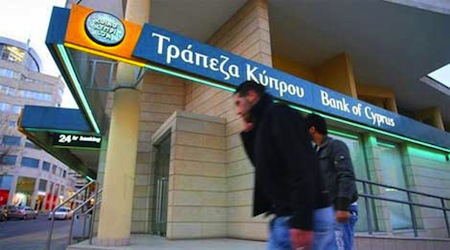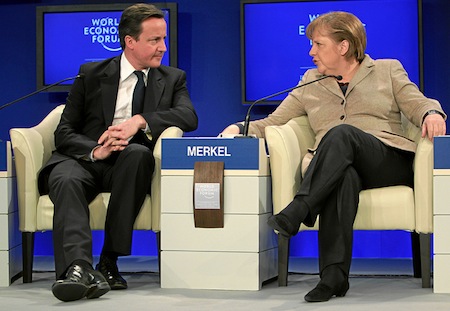Felix Salmon has a tantalizing tidbit about Olli Rehn, European commissioner for economic and monetary affairs, apparently conceding that a Cypriot default is now virtually inevitable, less than a month before the Cypriot presidential election:![]()
![]()
![]()
EU economics commissioner Olli Rehn went on the record telling him that Cyprus is going to have to restructure its debt — just two weeks after ruling such a thing out.
That might come as little surprise, given that Cypriot banks were loaded up to the gills with Greek debt, and Greek debt suffered a 70% haircut. Cyprus is tiny, and could never afford the €17 billion needed to bail out the banks and the government — especially since that would bring the country’s debt load up to more than 140% of GDP.
Salmon cites a report from The Wall Street Journal‘s Stephen Fidler reporting from Davos.
The Republic of Cyprus, with just over 800,000 people, is the third-smallest member of the eurozone (after Malta and Luxembourg), and it’s a relative newcomer to the single currency, having replaced the Cypriot pound for the euro only in January 2008, although the Turkish-controlled northern part of the island still uses the Turkish lira.
The country accounts for just 0.2% of the eurozone economy, though its GDP per capita is a relatively wealthy $29,000, and it’s been in negotiations for a bailout for some time now. That hasn’t yet been successful, in part because of the unique legal, political and financial complexity of the negotiations.
Rehn’s statement, if true, is essentially a declaration that time has run out — Moody’s downgraded Cypriot debt in July 2011 to junk status.
Nonetheless, a €17 billion bailout would be dwarfed by the Greek bailout (€245.6 billion), the Spanish bailout in July 2012 to provide liquidity to Bankia (€41 billion), and even the bailout provided by the ‘troika’ of the European Commission, the European Central Bank and the International Monetary Fund of Romania that began in 2009 (around €20 billion).
In many ways, a Cypriot default will be a key test for the European Union, given that it would be the first default since the treaty establishing the European Stability Mechanism formally came into effect at the end of September 2012.
Unlike in Greece, where much of its debt is governed by Greek law, much of Cypriot debt is governed under various international law, which will make it a messier restructuring.
Keep in mind, also, that the island of Cyprus remains split between the Republic of Cyprus (largely populated by Greek Cypriots) and the Turkish-occupied northern half of the island, the Turkish Republic of Northern Cyprus (largely populated by Turkish Cypriots). The island has been divided since a 1974 coup, Greece’s attempt to annex the entire island, and Turkey’s subsequent invasion, and the formal declaration of Northern Cyprus’s independence in 1983.
Add to that the fact that Cyprus is seen as a hub for worldwide money laundering, especially with respect to illicit funds from Russia, despite the protestations of Panicos Demetriades, president of the Central Bank of Cyprus, earlier this week.
That means bailout proceeds could go directly into the pockets of some of Russia’s wealthiest oligarchs, a position that’s unlikely to go down well politically throughout the rest of the eurozone, especially as Germany gears up for federal elections later this year — German officials have even demanded that Russia contribute to any Cypriot bailout.
Meanwhile, Cyprus will go to the polls in less than a month to replace Demetris Christofias, the country’s left-wing president since 2008. Unlike in many European countries with parliamentary systems, Cyprus’s president is both head of state and head of government.
With a default (orderly or otherwise) on the horizon, Cyprus now faces a presidential election on February 17 — with a runoff, if necessary, a week later on February 24 — in the midst of a financial crisis and perhaps in the midst of bank runs.
Christofias, who has presided over economic turmoil and an unemployment rate that’s now at 14%, has so far refused to engage in massive privatizations of state-run industries as a condition for a potential bailout.
Add all of those factors together — the size of the Cypriot banking sector’s debt, the legal complexity of the debt, the Russian laundering issue, the complexity of the Turkish political reality with Northern Cyprus, and the leftism of the Christofias administration — and you start to understand why Cyprus is now allegedly headed to a default.
Continue reading Europe concedes Cyprus default less than a month before presidential election

